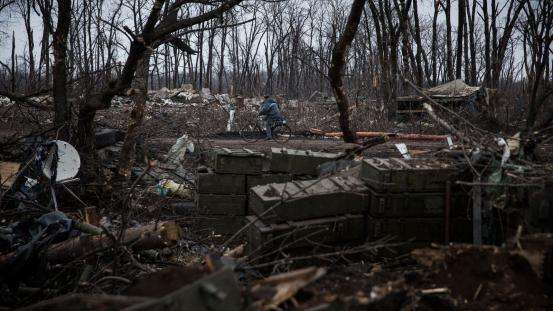- Commissioner’s statement on Ventura, Marte
- Ronnie O’Sullivan: Masters champion ‘felt so vulnerable’ in final
- Arron Fletcher Wins 2017 WSOP International Circuit Marrakech Main Event ($140,224)
- Smith challenges Warner to go big in India
- Moncada No. 1 on MLB Pipeline’s Top 10 2B Prospects list
- Braves land 2 on MLB Pipeline’s Top 10 2B Prospects list
- Kingery makes MLB Pipeline’s Top 10 2B Prospects list
- New Zealand wrap up 2-0 after Bangladesh implosion
- Mathews, Pradeep, Gunathilaka to return to Sri Lanka
- Elliott hopes for rain for Poli
Escape from Donbass: UFC’s Nikita Krylov’s search for identity in the Ukrainian Crisis
- Updated: May 4, 2016

Prologue
A person might never really understand the depths of fear until they’ve plunged into the terrifying darkness of the coal mines in the Donbass.
The hellacious journey begins 600 metres below the surface. The only colours that accompany workers into the abyss are the metallic greys of the steel structures, the dim orange of their colleagues’ hard hats, and the pitch black of the coal. It is a recycled purgatory – frightened souls and hardened men collected together out of sheer necessity; each allowed back to the surface in the evening, each sent back down to the darkness the following dawn. For many, Sleep and death are the only avenues of escape.
Nikita Krylov came from a family of miners. He, like many of them, knew too well the strenuous conditions of the mines.
Uriel Sinai/Getty Images
“I am from a miner family in the Donbass and I used to work in a mine. It is hard man’s job. It is associated with power and character.”
The power comes from each day survived, trapped 1000 metres below the surface; a feeling of invincibility. The character lies in the resolve of those who survive. If the mines did not break you, nothing would.
The years he spent in near-suffocation below the surface-the crippling anxiety of the unknown-have stayed strong in his memory while being forced further and further from his home, along with his splintered family, in a country divided by warfare. The poetic parallels have been cruel, yet necessary.
They remind Krylov of who he truly is.
January 23, 2015
On a snowy evening in Stockholm, Sweden, two buses loaded with fighters arrived at the Tele2 Arena. The bitter cold was expected but still practically unbearable for the foreign combatants. They stood gaunt and shivering behind a curtain separating them from the rowdy audience; their thoughts fixated on the food they would get to consume once they weighed in.
Nikita barely noticed the cold. His only concern was the statement he was about to make.
The 6′ 3″ light-heavyweight carried his lanky frame with a nonchalant strut that heavily contrasts his fighting style. He listened to Joe Rogan recite each fighter’s name and waited patiently for his own. Krylov took a deep breath, removed his sweater, and approached the stage as the UFC commentator bellowed his ‘Al Capone’ nickname-one he disliked vehemently-with characteristic shrillness.
Nikita pivoted around the corner and appeared on the Fox Sports 1 broadcast for the first time, a sly smirk creeping across his face. A plain black shirt with illegible writing-at least to the average English speaker-covering his upper body. It was a statement to the past six months that Krylov had endured; eight letters that epitomizes the hell at home.
Х#Й ВОЙНЕ (F##K THE WAR)
Little did Nikita know, and despite his small gesture to a homeland engulfed in civil war, he had already completed his final training camp in Ukraine.
March 20, 2015
On the first day of spring, Nikita arrived in Moscow for his inaugural training session at Fight Club №1 (Клуба единоборств №1). The decision to conduct his training camps across the border was as uncomplicated as it was calculated. Winter had been terribly difficult in Kiev; war raged on in Krylov’s homeland of Donetsk, leaving layers of devastation in its path. The country had plunged into a civil conflict and few could escape its traumatic effects. It was a winter that left many Ukrainians looked for spring’s warmth and invigoration with desperate longing.
What Krylov looked for, however, was an opportunity.
The building was simple enough: a standard three-storey complex with a tiled green and white exterior. A single sign with the gym’s logo hung above the entrance. The inside provided a stark contrast: exposed brick and varnished wooden tables paved a well worn path through the building back to the entrance of the gym.
The brickwork followed Nikita into the training room and lined the back wall of the massive space. A row of heavy bags hung menacingly from the ceiling and surrounded the boxing ring in the centre. It was pitch black with blue, white, and red ring ropes – the colors of the Russian flag.
For Nikita the setting was entirely comforting. It had been a while since he trained at a gym where the sound of gunshots and bombshells didn’t echo throughout the building.
Andrew Burton/Getty Images
Krylov had escaped the Donbass region of Ukraine shortly following the start of the conflict in mid 2014. Originally from Krasnyi Luch in …
continue reading in source www.bloodyelbow.com
